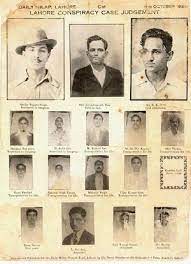HSRA (Hindustan Socialist Republican Association) was a revolutionary organization founded by Chandrasekhar Azad, Bhagat Singh, and others in 1928. The primary goal of HSRA was to overthrow British colonial rule in India and establish a socialist state.

HSRA’s founding members were deeply influenced by Marxist ideology and believed in the use of revolutionary violence to achieve their goals. They were inspired by the success of the Bolshevik Revolution in Russia and saw it as a model for their own struggle.
One of HSRA’s most significant actions was the bombing of the Central Legislative Assembly in Delhi in 1929.
HSRA played a significant role in the Indian independence movement and inspired many young people to join the struggle against British rule. The organization’s revolutionary ideology and methods were a departure from the non-violent tactics of leaders like Mahatma Gandhi, and they remain controversial to this day.
Despite its relatively short existence, HSRA had a significant impact on Indian politics and society. Its legacy can be seen in the continued use of revolutionary rhetoric by some political groups and the ongoing debate over the role of violence in social and political change.
In conclusion, HSRA was a revolutionary organization that played a significant role in the struggle for Indian independence. Its use of violence and Marxist ideology set it apart from other groups in the movement and continues to be a subject of debate and discussion.
Important Links